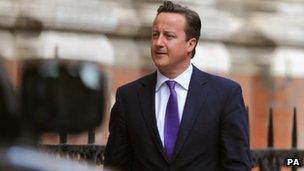Leveson Inquiry: Summary of week 23
- Published

The PM has submitted his witness statement and evidence of meetings, texts and emails
It was, arguably, the most politically charged week so far at the Leveson Inquiry with several senior politicians making appearances including Prime Minister David Cameron and his predecessor, Gordon Brown.
The inquiry heard that <itemMeta>news/uk-18437287</itemMeta> after the Sun paper switched loyalty to his party.
Mrs Brooks sent the text to David Cameron on the eve of his speech to the 2009 Conservative Party conference.
The prime minister appeared at the inquiry on Thursday.
He also said Culture Secretary Jeremy Hunt's appointment to handle News Corporation's bid to buy BSkyB "was not some rushed, botched, political decision".
And he said hiring ex-News of the World editor Andy Coulson had "haunted" him.
Mr Coulson became Mr Cameron's communications chief after resigning from the paper when its royal editor Clive Goodman was jailed for phone hacking.
NHS apology
The week started with an appearance by the prime minister's predecessor, Gordon Brown.
On Monday, the former prime minister <itemMeta>news/uk-18386968</itemMeta>
The Sun ran a story in 2006 about Fraser Brown's medical condition, but denied accessing his medical records.
Covering his relationship with the media in general, Mr Brown also said that, contrary to many reports, he did not instruct his aides to use the media to brief against ministers, in particular to attempt to force Tony Blair's resignation towards the end of his time in office.
Chancellor George Osborne gave evidence at the inquiry on the same day.
He told the inquiry <itemMeta>news/uk-18398951</itemMeta>
The chancellor said News Corp's £8bn bid for the broadcaster had been a "political inconvenience".
Backing Blair
On Tuesday another former prime minister, Sir John Major, told the inquiry that Rupert Murdoch had warned him to switch policy on Europe or his papers would not support him.
Sir John recalled the exchange from a private meeting in 1997, which he said he had not spoken about before.
His Conservative party lost power to Labour later that year, with the Sun backing his rival Tony Blair.
Labour Leader Ed Miliband and his deputy Harriet Harman also gave evidence on Tuesday.
Mr Miliband said Mr Murdoch's dominance of the British media <itemMeta>news/uk-18412172</itemMeta>
The Labour leader said his aim was "not to stifle one particular organisation or another - my aim is plurality".
And he said he had been "too slow" to speak out on the phone hacking issue.
On Wednesday, Scotland's First Minister Alex Salmond <itemMeta>news/uk-scotland-scotland-politics-18412596</itemMeta> although the paper said it had been "unable to find any evidence to substantiate the allegation".
Deputy prime minister and Liberal Democrat leader Nick Clegg also gave evidence on Wednesday.
He told the inquiry <itemMeta>news/uk-18421361</itemMeta>